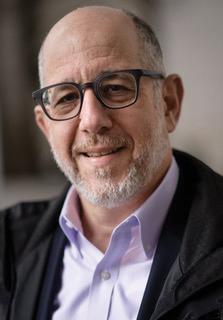
Organizing Progressive Dollars in the Midst of a Ravaged Economy

Before anyone knew the word coronavirus or phrases like social distancing and flattening the curve, Mark Pinsky spoke at Weavers Way’s 2019 Fall General Membership Meeting about his new book “Organized Money: How Progressives Can Leverage the Financial System to Work for Them, Not Against Them.” Mark is a towering figure in the world of CDFIs —Community Development Finance Institutions. Their mission is to leverage funds for peoples’ benefit, along with rewarding investors.
Pinsky and co-author Keith Mestrich, president and CEO of Amalgamated Bank, are unabashedly progressive, promoting a communitarian, inclusive vision for our country and world. The majority of Americans share these goals, but in looking at our financial system, one would think otherwise. It skews conservative, favoring the rich, white, male, straight, and already powerful. Because Team Blue lacks robust financial organization, their dollars default to the existing money infrastructure; hence, progressive resources are benefiting the conservative agenda. Mark and Keith lay out a pathway to fix this.
I caught up with Mark for his thoughts on what is coming next, given the current economic devastation and health crisis. WWMD (What Would Mark Do?), if he ran the zoo?
During our discussion, Mark highlighted that 33 million Americans have filed for unemployment and 27 million could lose their health insurance. Their alternative is Obamacare, coverage Republicans in Congress are actively trying to eradicate.
What are your predictions as to how we will invigorate our economy in light of the unprecedented shock of this size?
Predictions are hard with two big unknowns — who will be president and when will COVID-19 be under control.
Economic activity will not be a ‘V’ like most people expect; it will take at least 18 months to get back to something resembling what it was like just a few months ago. By early 2021, some existing businesses — as well as new ones — will be growing at a good pace and hiring again. In the third quarter of 2021, I expect we’ll start to feel like the economy is coming to life overall. For now, most businesses will be struggling, waiting to see who wins the 2020 elections. The stimulus bills are, not surprisingly, skewed to lift big businesses, so Democrats will need to be selective in what they push.
What are your top priorities for aid/relief?
The top of my list is affordable health care; [also] safe, affordable housing, financial well-being for individuals (particularly access to money to pay living costs and cover emergencies), and small business growth. This needs to be done with a move from “greed is good” capitalism to a more humane form, as we describe in “Organized Money.”
CDFI Funds are included in the third coronavirus relief bill. How is that playing out?
Big financial institutions, small banks, large and small city governments, corporations ranging from Google to Verizon and more have invested almost $2 billion into CDFIs in the last two months. CDFIs use that and the $180 billion they already hold to finance businesses that can’t get PPP funds, families that can’t pay bills after losing jobs, and nonprofits that are in trouble.
What personal action can people take to help promote organizing progressive money?
A friend in Chicago has set up Mighty Deposits (www.mightydeposits.com) that gives users a snapshot of how their bank is working for or against their values. It’s a lot of fun and I urge everyone to try it out. Also, progressive banks and credit unions have improved their online accessibility during the crisis. Check them out while you have time on your hands.
As [former Chicago Mayor] Rahm Emanuel advised, we should never let a serious crisis go to waste.
Mark’s book is available at the Co-op. If you don’t see it on display, ask a staff member.
